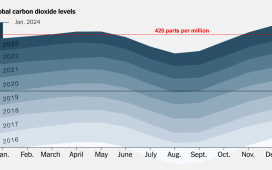It was the boom heard around Salt Lake City on Saturday morning that had everyone from meteorologists to the Utah governor wondering — was it thunder or maybe an earthquake?
But within a few hours, forecasters at the National Weather Service said they had solved the mystery: It was simply a meteor hurtling through the air.
Thunderstorms swept through the area around 6 a.m. local time but cleared out by sunrise. Around 8:30 a.m. there was a distinctive “boom” heard throughout Salt Lake City, prompting people to take to social media and share footage of the noise they had heard.
Some wondered whether it was an earthquake. But the University of Utah Seismograph Stations, which monitors earthquake activity, confirmed in a tweet that no such activity was recorded.
Others thought maybe it was a training exercise at the Tooele Army Depot, a military base and storage facility near Salt Lake City. In April, a similarly loud boom turned out to be the army post detonating materials during annual, planned exercises, according to the local ABC affiliate.
Governor Spencer Cox of Utah said that he had heard the noise while out on a run and that it was not related to the military. The governor said a meteor was “likely the best theory.”
The National Weather Service then chimed in on Twitter to say that two “reddish pixels” were detected on a Geostationary Lightning Mapper, which detects lightning. However, the Weather Service said that the pixels were not related to thunderstorms but were instead “likely the meteor trail/flash.”
“We’ve now got video confirmation of the meteor heard across northern Utah, southern Idaho and elsewhere this morning,” the Weather Service said on Twitter.
The meteor spotting coincided with the peak of the Perseid meteor shower, which peaked Thursday night into early Friday morning. (The Sturgeon Moon made it harder to see the shower this year.)
Mike Hankey, operations manager for the American Meteor Society, said there had been more than a dozen reports to the organization confirming fireball sightings.
Mr. Hankey said that several people had reported seeing the meteor and then a “delayed” boom, which happens when the object “penetrates deep into the atmosphere.”
“If the object is large enough, it will get close enough to the surface to make this sound,” Mr. Hankey said. “It is like a sonic boom in some cases; others can witness an air blast or explosion in the air.”
Since the meteor registered on the lightning map, Mr. Hankey said it was “significantly” bright. He added that it was possible, based on the delayed booms, that the meteor landed on the ground.
This is not the first time in recent memory that a meteor has caused brief panic or confusion.
In January, a meteor was likely to have exploded over Pittsburgh and created noise similar to that in Salt Lake City. And in 2020, an explosion-like sound from a meteor was heard in Syracuse, N.Y., and the fiery, red light was seen as far as Baltimore and Ontario, according to The Baltimore Sun. In October of last year, a boom that shook homes in New Hampshire gave rise to theories that an earthquake or an aircraft was to blame, but the sound likely came from a meteor.

